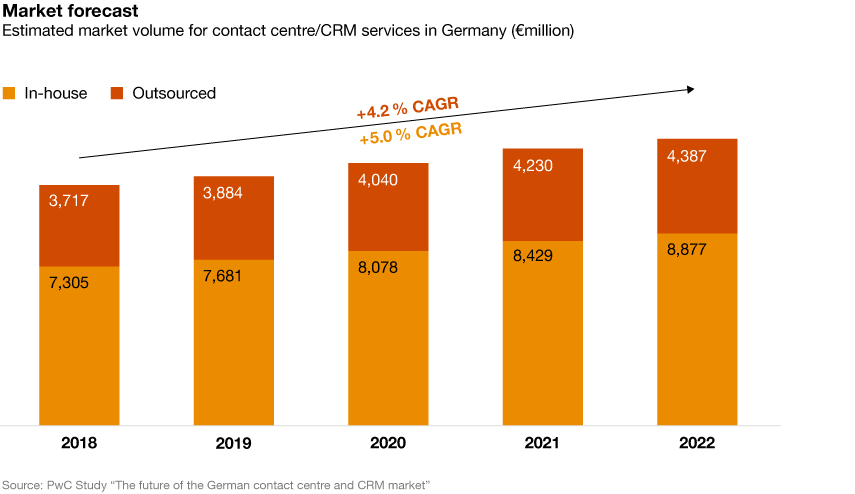
This study was published in January 2020 and therefore does not take the effect of COVID-19 into account. An update for the study currently in preparation. If you have any questions in the interim and would like to discuss with our experts, please click here.
Your expert for further questions

Matthias Riveiro
Partner, PwC Germany Customer Practice
Tel: +49 1512 5665932
Email
Digitalisation is changing the economy, products and services
In today’s markets, where substitute products are widely available, customer service is becoming an important differentiating factor. In Germany, a large proportion of customer service work is outsourced to external service providers – contact centre service providers and operators. These providers need to adapt their portfolios to the changes brought about by digitalisation and automation.
“Modern, future-proof customer service requires both flesh-and-blood service agents and software-based service bots.”
The study at a glance
Customer service 2.0 is becoming indispensable
Until a few years ago, contact centres focused mainly on customer service 1.0, provided almost exclusively by human customer service agents and call centre employees. Today, customer service 2.0 – integrating new technologies, such as artificial intelligence, robotics, speech recognition and voice recognition – is becoming increasingly popular. 60% of companies in the contact centre and CRM market feel that change is needed: they want to invest in service optimisation and holistic service transformation. In general, forecasts for this segment are positive: the outsourcing market for contact centre services and customer relationship management (CRM) will grow substantially in Germany. Total sales will increase from €11 billion in 2018 to €13.2 billion in 2022, an annual growth rate of 4.2% for outsourced services and 5.0% for in-house services. These are among the results of our latest analysis: “The future of the German contact centre and CRM market 2020”.

The role of technology in contact centres of the future
Investment in future-proof technology is crucial for profitable services and long-term customer relationships. Automating customer service processes and providing customer self-service is just as great a challenge. Artificial intelligence (AI) is paramount for implementing new business models and for training bots and apps, but other software technologies are also crucial for success – from cloud computing, robotics and RPA to data analytics.
The importance of customer service 2.0
Companies can succeed in the German contact centre/CRM market in the long term if they achieve EBIT margins of 8% to 10%. Customer service 2.0 is a crucial lever for achieving this: it allows end-to-end processing of customer enquiries, either as an integral component of product services or as a stand-alone service handled by external service providers. Considered in isolation, customer service 2.0 can achieve EBIT margins of 12% to 20%, providing a basis for investment and healthy growth which benefits both service providers and clients.
“Without an industry-specific portfolio of these new services, customer service providers will end up well behind the competition – if they survive at all.”

The expectations of end consumers
Today’s end consumers can constantly obtain information through mobile devices, apps and social media. They expect the same from customer service: companies should be able to answer questions competently, quickly and at any time, providing information through a variety of digital channels. Customer service providers need to be aware of their customers’ ‘digital impatience’ – and meet their expectations with innovative digital solutions. To provide customers with easy access to information about products and services via their preferred channels, companies are increasingly turning to customer-centric self-service, such as on company websites. Chatbots on social media platforms are also becoming increasingly important. These channels enable customers to get quick answers at any time – though only to relatively simple questions at present – without having to speak to customer service staff.

The role of humans in contact centres of the future
As machines handle an increasing proportion of simple customer queries, so the demands on human customer service agents will rise, and they will need to specialise in activities requiring empathy and communication skills. Contact centre providers need to invest in know-how among their customer service agents, and create a new profile of the profession to attract highly qualified people. Many millennials expect more from their employers than older generations do, and are more likely to switch jobs if they are not satisfied. Employee turnover in German contact centres is accordingly high, at between 20% and 40%.
“Traditional call centres, relying purely on inbound sales and with no specialisation in any specific industry, will no longer exist in 2025.”
Conclusion
What companies need to know about customer services
1. Customer service and its quality are key success factors
Numerous studies show that most companies consider better customer experience and customer satisfaction to be among their top priorities; indeed, these factors are often the main drivers of digital transformation.
2. Higher standards of service require more efficient processes
In order to successfully use digital business models, companies need a corresponding efficiency-driven operating model. Under these models, processes with poor value-adding potential will be provided almost entirely by external service providers. Core business processes, on the other hand, will remain within the company.
3. Companies are primarily investing in in-house services
The more important customer service becomes for value creation, and the more central it becomes to the business model, the less frequently companies will outsource it to external service providers.
What service providers need to know
Companies using customer services are focusing investment on in-house services. This will reduce the outsourcing market volume, and in turn increase competitive pressure on customer service providers.
1. The importance, number and complexity of customer enquiries are rising
The demand for customer service will continue to grow due to the rise of digital and increasingly service-centric business models. At the same time, the importance of customer service for clients is growing, as is the complexity of individual enquiries.
2. Growing need for technological expertise and resources
Customer service providers need sufficient resources (both technical and human) to cope with the increasing volume of customer services. At the same time, technology- and industry-specific service skills are becoming increasingly important – especially in the process of developing high-quality customer service 2.0.
3. Traditional call centre services are becoming less important
As quality of service and technological expertise are becoming more important, commodity services such as classic call centre services are becoming less important. Innovative digital services are the key to reshaping the customer journey in almost all industries.
Methodology
Against the background of steadily advancing consolidation and transformation of the German contact centre market, PwC has conducted a market analysis specifically focused on digital ‘customer service 2.0’. It answers the question of how digital services contribute to profitable growth of contact centre service providers and users of outsourcing services. This analysis ties in with our Contact centre outsourcing study, published in 2018. Our new study is based on the PwC market model, which enables us to outline the entire market volume of contact centre and CRM services. This allows us to map macroeconomic trends – such as the overall growth of individual industries – and to quantitatively model trends in outsourcing or insourcing; for example, trends due to systemic changes in cost structures. We also conducted qualitative surveys among contact centre service providers and clients from various industries to find out about the development of demand and prices for contact centre services.
Interview with PwC expert Matthias Riveiro

“High-quality customer service of the future will primarily depend on a good interface between human and machine.”
To what extent is digitalisation changing the customer service sector?
Matthias Riveiro: More and more customers expect to be able to use personalised services around the clock, and they expect company contact centres to process their enquiries quickly. Customer experience is becoming a crucial differentiating factor on the market. To be successful, you need outstanding customer relationship management (CRM) and customer services that set you apart from the competition. Innovative technologies such as artificial intelligence play a crucial role in this development.
So will machines be dealing with our enquiries in the future?
Riveiro: Machines are already processing millions of customer questions today, mainly simple enquiries that can be reduced to standardised interactions. But when it comes to more complex issues, human employees are still indispensable. But a shift is taking place here as well: in the future, 80% of customer enquiries are likely to be dealt with automatically – for example, using chatbots and voicebots, or intelligent self-service.
What does this mean for contact centre employees?
Riveiro: Contact centres of the future will need far fewer people than today. In the future, highly qualified customer service agents will be only used for interactions where automated solutions do not work satisfactorily. Nevertheless, around 20% of customer enquiries will still have to be dealt with by humans. This means that human customer service agents will require new skills. High-quality customer service of the future will primarily depend on a good interface between human and machine. Without the help of technology, human employees will be unable to provide the customer service of the future while still covering the resulting costs.
Contact us



